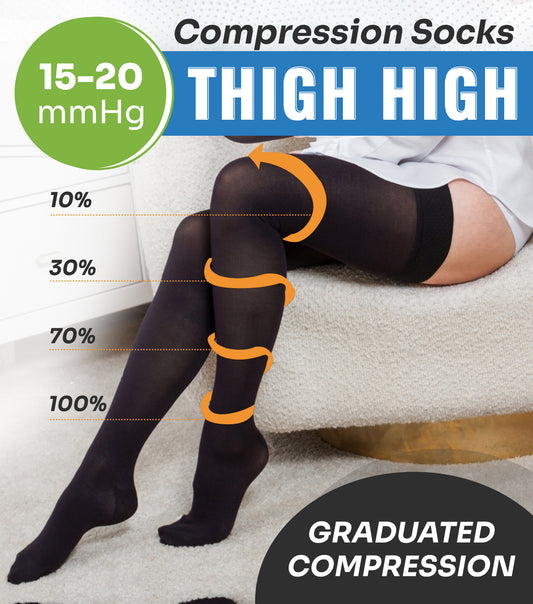

Featured Products
-
20-30 mmHg Compression Stockings Thigh-High, Closed Toe
Regular price $24.99Regular price Sale price $24.99Unit price -
15-20 mmHg Compression Stockings Thigh-high, Closed Toe
Regular price $24.99Regular price Sale price $24.99Unit price -
Anti-Embolism Stockings Thigh High, 15-20 mmHg, White
Regular price $14.99Regular priceUnit price$16.99Sale price $14.99Sale
Carpal Tunnel Syndrome (CTS) is a painful condition that affects the hand and wrist. It occurs when the median nerve, which runs from the forearm to the hand, becomes compressed through the carpal tunnel in the wrist. This compression can cause pain, numbness, and tingling in the hand and fingers. Here, we will explore symptoms, causes, and treatment options for Carpal Tunnel Syndrome.
Symptoms of Carpal Tunnel Syndrome
The symptoms can vary depending on the severity of the condition. Some common symptoms include:
- Pain or discomfort in the hand and wrist, which may radiate up the arm
- Numbness or tingling in the hand and fingers, especially the thumb, index, and middle fingers
- Weakness in the hand and difficulty gripping objects
- A sensation of swelling in the fingers, despite no visible swelling
The symptoms of Carpal Tunnel Syndrome typically develop gradually and may worsen at night. Over time, the condition can cause weakness in the hand and make it difficult to perform everyday tasks.
Causes of Carpal Tunnel Syndrome
The exact causes still need to be fully understood, but several factors may contribute to its development. These include:
-
Repetitive motions:
Continuous use of the hand and wrist in repetitive movements, such as typing or using a computer mouse, can pressure the median nerve.
-
Injury or trauma to the wrist:
A wrist injury or trauma, such as a fracture or sprain, can cause swelling and inflammation in the wrist, compressing the median nerve.
-
Health conditions:
Certain health conditions, such as diabetes, rheumatoid arthritis, and thyroid gland imbalance, can increase the risk of developing CTS.
-
Hormonal changes:
Hormonal changes during pregnancy can cause fluid retention, which can compress the median nerve and cause this syndrome.
Treatment of Carpal Tunnel Syndrome
The treatment of Carpal Tunnel Syndrome depends on the severity of the condition. Mild cases may be treated with rest and self-care measures, while more severe cases may require medical intervention. Some common treatments include:
-
Wrist Brace: A wrist brace or wrist support for Carpal Tunnel Syndrome can help to keep the wrist in a neutral position, reducing pressure on the median nerve. Wrist splints can be worn during the day or at night, depending on the severity of the condition. Wrist braces are typically made of a lightweight, breathable fabric and are designed to fit comfortably over the wrist and hand. There are several types of wrist support for Carpal Tunnel Syndrome, including:
-
Rigid wrist braces:
These are made of a complex, plastic material that restricts wrist movement. They are typically worn at night to help prevent symptoms from worsening.
-
Soft wrist braces:
These are made of soft, flexible material designed to provide gentle support to the wrist. They can be worn during the day to help alleviate symptoms.
-
Custom-fitted wrist braces:
These are made specifically for the individual and are designed to provide a customized fit and maximum support.
-
Rigid wrist braces:
-
Medications: Nonsteroidal anti-inflammatory drugs (NSAIDs) can help to reduce pain and inflammation in the wrist. These medications are typically taken orally and can be purchased over the counter or prescribed by a healthcare provider.
-
Physical Therapy: Physical therapy exercises can help to strengthen the muscles in the hand and wrist, improving flexibility and reducing pressure on the median nerve. A physical therapist can also teach you stretches and exercises to perform at home to help alleviate symptoms of CTS.
-
Surgery:
In severe cases of CTS, surgery may be necessary to relieve pressure on the median nerve. During the surgery, the carpal tunnel is widened, reducing pressure on the median nerve. Surgery is typically only recommended if other treatments have been unsuccessful.
Prevention of Carpal Tunnel Syndrome
While it may not be possible to prevent Carpal Tunnel Syndrome completely, several steps can be taken to reduce the risk of developing the condition. These include:
-
Taking frequent breaks:
Taking frequent breaks and changing hand positions can help reduce wrist strain and prevent CTS. If you work at a computer for long periods, take regular breaks to stretch your hands and wrists.
-
Using ergonomic equipment:
Using ergonomic equipment, such as a keyboard or mouse, can help to reduce the risk of developing CTS. Ergonomic equipment reduces strain on the hands and wrists and promotes proper posture and alignment.
-
Maintaining a good posture:
Maintaining a good posture while sitting or standing can reduce pressure on the wrist and prevent CTS. Keep your shoulders relaxed and your wrists in a neutral position.






